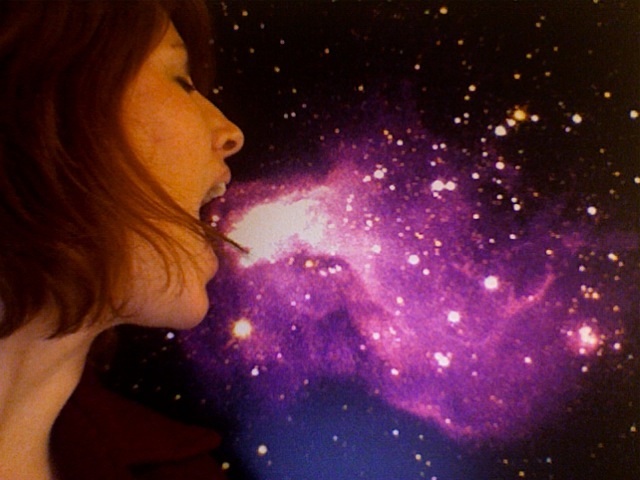(greenbelt) thoughts on a happy NASA moment

a colleague of mine snapped this photo - i saw him there with the camera and thought he might have captured the moment when mather walked into the room packed with several hundred NASA goddard family members. i happened to be standing in the crowd right in front of mather when he came in and raised up his badge with joy and pride. that's me with the flaming red hair and flaming white bra. (oops. i didn't know that sweater is transparent.)
anyway, sometimes you get to experience moments of the good kind of pride - the kind that results from peoples' honest efforts and groundbreaking achievements. this nobel prize was a huge thing for us at NASA. and more specifically, those of us in mather's directorate at Goddard. not only is it the first time a NASA scientist has ever received a nobel prize, but it comes at a really rocky time for science (and scientists) at NASA. on the walk back to my building i had this conversation with a random colleague whom i don't know:
him: "were you just at the thing?" [the "thing" being mather's celebration - there were champagne and balloons and cheese and everything]
me: "yup."
[silence]
me: "happy day."
him: "yeah."
me: "it's encouraging."
him: "yes."
[pensive silence]
him: "huge morale boost. we really needed it."
you see, it's hard to describe, but there's sometimes a sense that being a NASA scientist puts one at a disadvantage in the scientific world (the "real" world of academia, research institutions, and industry). scientists often put in a lifetime of difficult work trying to juggle true research with the unique kind of work associated with missions and projects. being a project or program scientist often involves a disproportionate amount of non-scientific effort. to get useful scientific results can require millions or billions of dollars, lots of luck, teams of thousands of people (mather's COBE team numbered more than 1500), tremendous bureaucratic and engineering obstacles, and sometimes decades of nervous waiting. the stars and planets literally have to align. so for mather to receive this prize says to us that such efforts are sometimes worth it. it also gives us hope that what we're doing *is* actually worthwhile, or at least it can be. as mather said in the press conference the day before yesterday, "we always knew what we were doing is important. now *everyone* knows it's important." (probably a slight paraphrase, but you might be able to find the actual quotation if you care to.)
it seems to me that there is great value in these high-visibility prizes. the COBE telescope's results were the first indisputable evidence in support of the Big Bang theory, which many people probably still think is still in dispute. at the very least, it disproved all the competing scientific theories. if not for this nobel prize, the knowledge of that result would have been much more likely to remain confined to the scientific community. notwithstanding the room full of astrophysicists that gave mather the standing ovation at the scientific conference where he presented the results, the world at large would have remained much more in the dark. i have listened to him twice now summarize the three big findings of COBE and why they're important. scientists don't often get such opportunities to broadcast their findings so succinctly to a world of non-scientists who are lending an interested ear. three cheers for the swedes and the idea of the nobel prize.


1 Comments:
Congrats, that is quite an accomplishment!
Post a Comment
<< Home